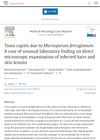 August 2024 in “The Journal of Urology”
August 2024 in “The Journal of Urology” The 2024 guideline updates recommendations for genetic testing, imaging, and sperm retrieval in male infertility.

Variant G of the KRTAP20-1 gene improves wool curliness in Chinese Tan sheep.
 May 2024 in “Brain disorders”
May 2024 in “Brain disorders” Agmatine may help reduce seizures linked to hormone changes in female rats.
May 2024 in “Journal of Fungi” Tinea capitis in adults, especially postmenopausal Black women, needs prompt treatment with oral antifungals to avoid scarring.
 May 2024 in “International journal of surgery case reports”
May 2024 in “International journal of surgery case reports” A man had a large, rare cyst in his mouth removed after 10 years, which fixed his swallowing and breathing problems.
 April 2024 in “Materials today bio”
April 2024 in “Materials today bio” The CuCS/Cur wound dressing helps regenerate nerves and heal deep skin burns by rebuilding hair follicles.
 April 2024 in “Cosmetics”
April 2024 in “Cosmetics” Different oils affect hair flexibility and strength, with their impact varying on whether hair is virgin or bleached.
April 2024 in “Journal of composites science” Hydrogel composites have great potential in regenerative medicine, tissue engineering, and drug delivery.
April 2024 in “Molecules/Molecules online/Molecules annual” The composite sponge helps heal diabetic wounds by reducing inflammation and promoting new blood vessel growth.
 April 2024 in “Skin appendage disorders”
April 2024 in “Skin appendage disorders” Environmental pollutants can damage hair health and cause hair loss.
March 2024 in “Molecules/Molecules online/Molecules annual” Enzymatically extracted bear oil has more unsaturated fats and significantly increases hair growth in mice.
 March 2024 in “Authorea (Authorea)”
March 2024 in “Authorea (Authorea)” Using lyopreserved umbilical tissue allograft may improve healing and reduce recurrence of pilonidal cysts.
 March 2024 in “Advanced science”
March 2024 in “Advanced science” A new hydrogel made from human cells improves wound healing by working with immune cells to promote repair.
 March 2024 in “Animal nutrition”
March 2024 in “Animal nutrition” Adding both soluble and insoluble fibers, especially beet pulp, to the diet of pregnant sows helps improve their health and the growth of their piglets in hot weather.

Meis2 is essential for touch sensation and nerve function in mice.

Meis2 is essential for touch sensation and proper nerve connection to touch receptors in certain skin areas of mice.

The transcription factor Meis2 is essential for touch sensation and proper nerve development in touch receptors.
The KRT84 gene is linked to better wool quality in Gansu Alpine Fine-wool sheep.
 February 2024 in “Medical mycology case reports”
February 2024 in “Medical mycology case reports” Unusual fungal structures were found in a boy's scalp infection, successfully treated with medication.
KRTAP6 genes affect wool quality in sheep.
 January 2024 in “ACS Biomaterials Science & Engineering”
January 2024 in “ACS Biomaterials Science & Engineering” A new method using a microfluidic device can prepare hair follicle germs efficiently for potential use in hair loss treatments.
January 2024 in “Metabolites” Standardized procedures are crucial for collecting and preparing biological samples to ensure accurate clinical metabolomics results.
 December 2023 in “The journal of physical chemistry. B (1997 : Online)”
December 2023 in “The journal of physical chemistry. B (1997 : Online)” Human hair keratin might be good for filtering out harmful substances from water.
December 2023 in “Pharmaceutics” The new adhesive nanoparticles are effective for delivering Minoxidil to the scalp without skin irritation.
November 2023 in “Applied sciences” Pig blood can be used to mass-produce stable, low-cost platelet dry powder for medical use.
November 2023 in “Cosmetics” Rice derivatives in conditioners protect and improve hair health.
Human hair can almost fully recover its structure within about 1,000 minutes after being stretched.

Arabica coffee pulp extract may help prevent hair loss and promote hair growth.
The KRTAP36-2 gene in sheep affects wool yield.
 October 2023 in “Cell & bioscience”
October 2023 in “Cell & bioscience” A special gene region controls the re-emergence of a primitive wool type in Merino sheep, improving their wool yield and adaptability.


















